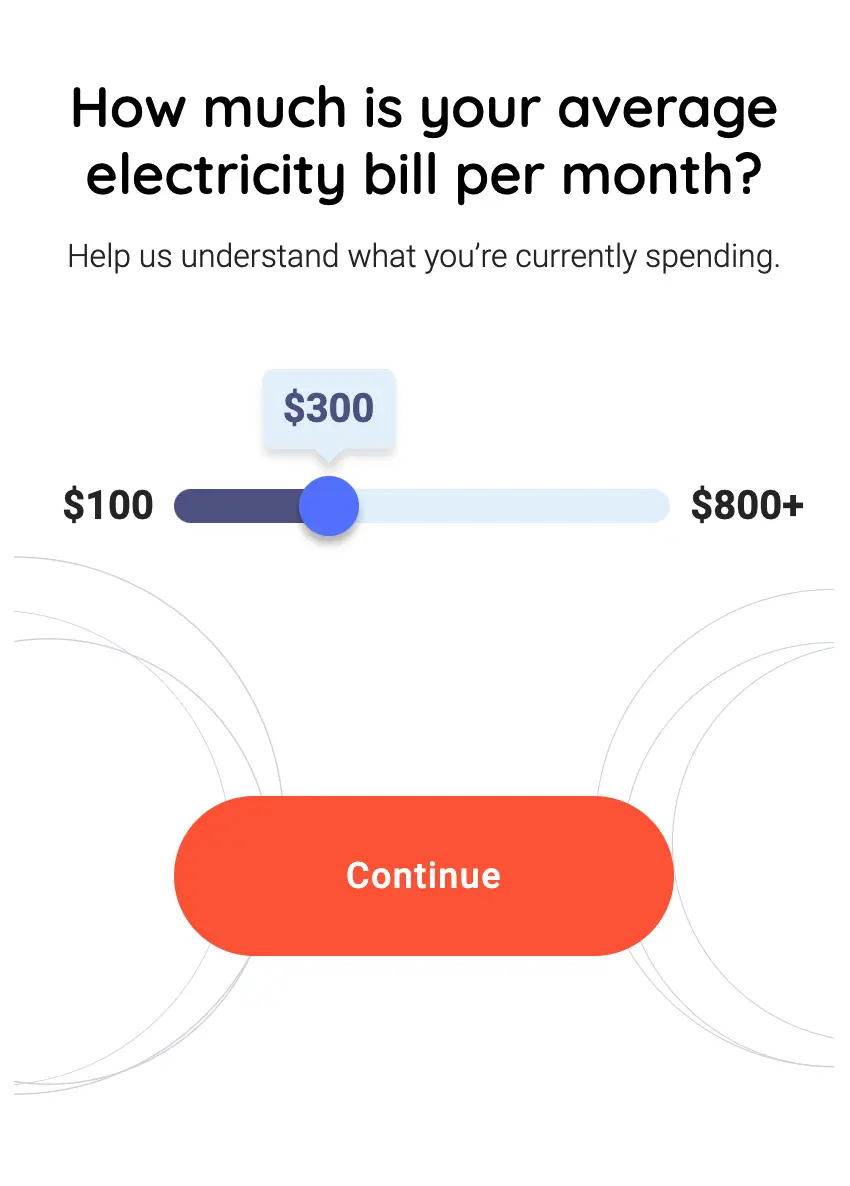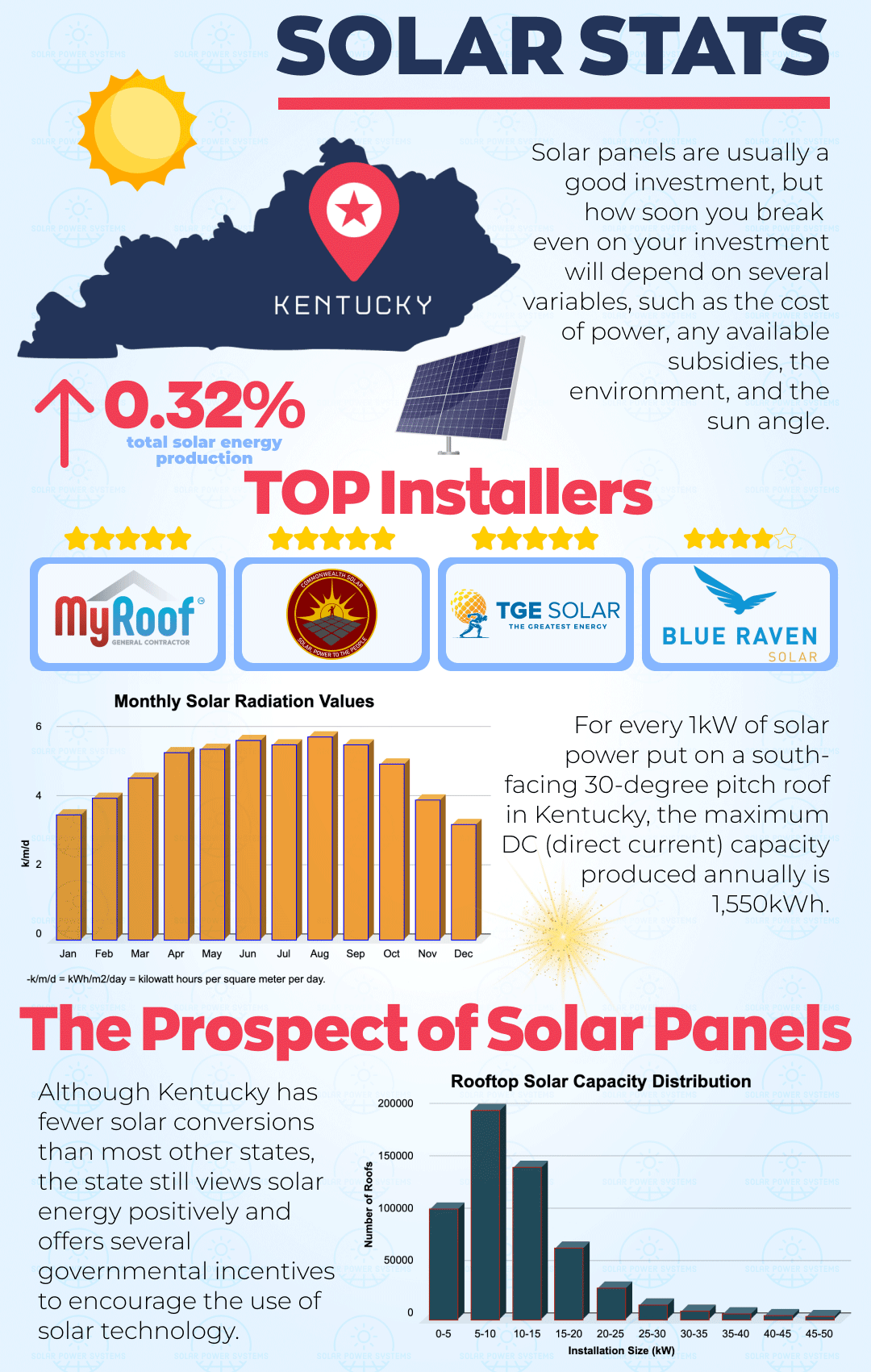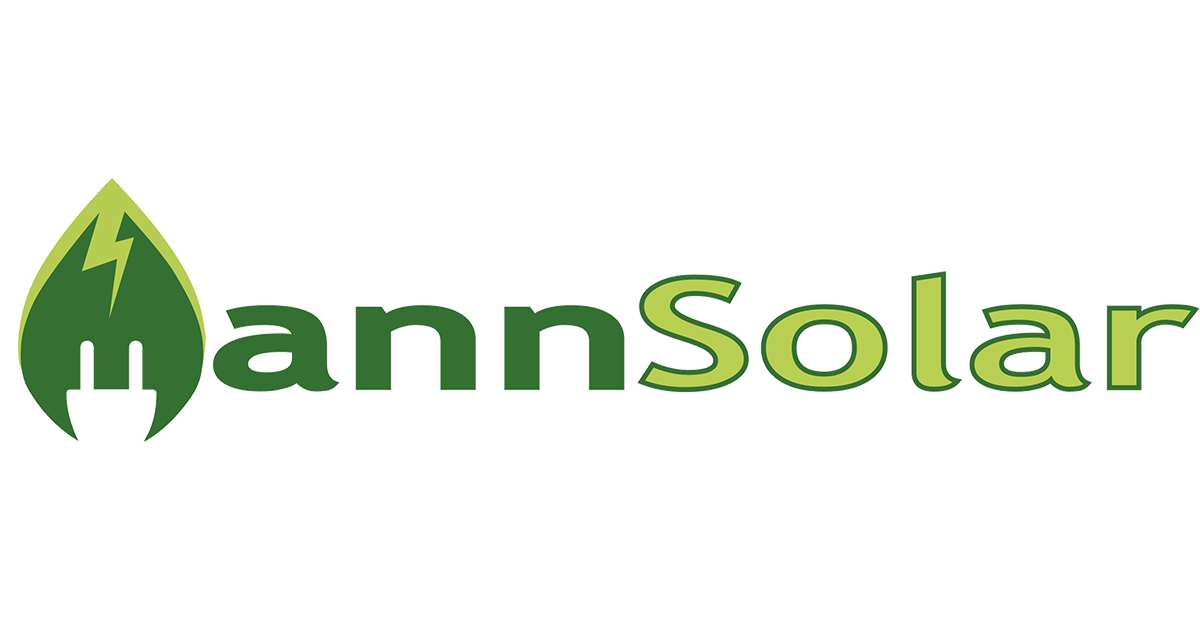Kentucky’s sunny days make it prime for solar power, and the state’s solar incentives are improving. Finding the right installer is crucial, though. It’s not just about cost, but the quality of service, reliability, and expertise. We’ve scoured customer experiences and performance data, finding the best installers for your solar needs.
Kentucky embraces solar, with policies supporting residents going green. Incentives like net metering and tax credits make solar appealing. That’s why it’s important to choose an installer who’s knowledgeable about these benefits. The best ones ensure you gain every advantage available in the Bluegrass State.
Local climate knowledge is key, too. Installers familiar with Kentucky’s weather patterns tailor solar solutions effectively. They make sure your panels perform optimally, come rain or shine. Our guide only features installers with proven adaptability to our region’s unique conditions.
Let’s talk credibility. The top installers in Kentucky are certified and adhere to state regulations. They prioritize safety and efficiency. We’ve picked those with sterling reputations for professionalism and compliance, so your installation is in good hands. Their track record speaks volumes.
You’re investing in your home, the environment, and your future. Our guide zeroes in on the solar installers who get this. They offer the best technology, warranty, and support. You’re not just buying solar panels; you’re choosing a partner for this sustainable journey. Let’s help you make an informed decision.
Find the Best Solar Installers in Kentucky
We have compiled ratings of local solar installers in Kentucky and recommend proven solar panel installation companies you can trust.
Use the search form to find more local solar installers in your area. Enter the Address or Zip Code and choose the distance range from your location.

Why Go Solar in Kentucky?
Embracing solar power in Kentucky offers a host of benefits that go far beyond mere cost savings on utility bills. Think of it as your personal contribution to battling climate change, given that solar energy is a clean, renewable source that reduces reliance on fossil fuels and cuts down carbon emissions. Kentucky, with its generous number of sunny days, provides an ideal setting for harnessing solar energy efficiently. Additionally, the state’s net metering program allows you to earn credits on your electric bill for any excess power your system produces and returns to the grid. By going solar, you also protect yourself against the volatility of energy prices; once your panels are up and running, you’ve essentially locked in your electricity rates, making household budgeting more predictable. Moreover, investing in solar panels can significantly increase your property value, making it an enticing draw for eco-conscious homebuyers should you decide to sell in the future. Lastly, Kentucky’s unique incentives, such as the federal Investment Tax Credit (ITC) and local rebates, can dramatically lower the upfront costs of installation, making the switch to solar energy not only an environmentally sound choice but an economically savvy one too.

How Solar Can Save You Money in Kentucky
In Kentucky, the average cost of electricity hovers around the national median, placing it at approximately 12 cents per kilowatt-hour (kWh). For an average household consuming about 1,000 kWh per month, electricity bills can quickly add up to a significant monthly expense. However, the installation of solar panels presents an attractive opportunity to reduce or even eliminate these costs.
Solar panels convert sunlight into electricity, which means that once installed, the energy they produce is virtually free, apart from maintenance and potential financing costs for the system. Kentucky’s abundant sunny days contribute to the effectiveness and savings potential of solar power systems in the state. Homeowners who go solar often see dramatic decreases in their monthly energy bills.
For a real-world perspective, let’s consider the case of the Smith family from Louisville. After installing a 5 kW solar panel system, their monthly energy costs dropped from an average of $120 to virtually $0 for energy production. Over the first year alone, they saved approximately $1,440. These savings will grow over time as the cost of traditionally sourced electricity continues to increase, and with solar panels having a lifespan of 25-30 years, the long-term benefits are substantial.
Adding to these savings is Kentucky’s net metering policy which allows solar panel system owners to receive credit for the surplus energy their system generates and feeds back into the grid. This means that during times when the panels produce more electricity than the home uses, the excess can be sold back to the utility company, providing further reductions on energy costs or even a passive income stream.
While net metering in Kentucky has been subject to legislative changes, it still offers a favorable environment for solar adopters. As such, homeowners can offset their energy consumption with the energy they produce, and potentially reach a point where their solar panels are not just reducing, but completely covering their electricity needs.
Getting Solar Quotes in Kentucky
When you’re diving into the world of solar power in Kentucky, getting a final solar quote can be an intricate part of the process, and there’s a lot to consider to ensure you’re getting the best value for your investment. The total installation cost of a solar system isn’t just about putting panels on your roof—it’s a comprehensive package.
Hardware costs are at the core of your solar system—they include solar panels, inverters, mounting systems, and sometimes battery storage solutions. These components vary in price depending on the quality, efficiency, and capacity you opt for. Essentially, you get what you pay for, so it pays to invest in reliable, high-performing equipment.
Installation fees encompass the labor and expertise required to safely and effectively set up your solar array. This is where choosing an experienced installer matters. While it might be tempting to cut corners, skilled workmanship ensures your system operates at peak efficiency and adheres to local building codes and regulations.
Post-installation services might include system monitoring, maintenance, repairs, and customer service. These are crucial for the long-term health of your system. A provider with solid post-installation support can be a game-changer, offering peace of mind over the lifespan of your solar investment.
Warranty terms also play a pivotal role in your solar quote. A comprehensive warranty can protect you from unforeseen expenses if components fail or underperform. Read the fine print—good warranty conditions can signal a quality product.
Understanding the payback period, financing options, and performance estimates is essential. You’ll want to calculate how long it will take for energy savings to offset the initial cost—a shorter payback period means faster financial benefits. Explore various financing options such as loans, leases, or Power Purchase Agreements (PPAs) to determine what aligns best with your financial strategy. Performance estimates, detailing how much energy your system will generate, guide these considerations.
In Kentucky, state-specific incentives can sweeten the deal. For instance, net metering policies allow you to send excess power back to the grid in exchange for credits, essentially lowering your utility bills. Additionally, the federal Investment Tax Credit (ITC), which offers a significant percentage off your system’s cost, can impact your initial outlay.
In short, a final solar quote is a multi-faceted document that encapsulates everything from hardware to aftercare. By understanding each component and how it affects your bottom line, along with tapping into Kentucky’s incentives, you’re empowered to make an informed decision—one that illuminates a brighter, greener future for your home or business.
Why Hire a Local Solar Company in Kentucky?
When you’re considering solar installation in Kentucky, opting for a local solar company brings several benefits you might not have initially thought of. For starters, these companies come with a wealth of knowledge about state-specific solar incentives that can make a big difference to your wallet. Unlike generic providers, local experts know the ins and outs of Kentucky’s solar programs, rebates, and tax credits, ensuring that you maximize your financial benefits.
Moreover, these professionals have a deep understanding of the local climate in Kentucky. Solar energy isn’t just about the panels—it’s also about knowing how the local weather patterns affect solar efficiency. This expertise allows them to recommend the best solar solutions that can withstand Kentucky’s unique weather conditions, from heavy rains to those surprisingly sunny spells. This tailored approach ensures your installation is primed for optimal energy production year-round.
Local installers are also well-versed in Kentucky’s installation regulations, which guarantees compliance and takes the hassle out of navigating bureaucratic hurdles. They make sure that your installation adheres to all building codes, utility requirements, and safety standards, providing peace of mind that everything is done by the book.
Considering professional installation? The advantages are clear. Safety is paramount when it comes to solar installations—working with high voltages and on rooftops is something best left to the experts. Professional installation brings expertise that eliminates the risks inherent in a DIY approach. Moreover, properly installed systems come with warranties that protect your investment if something goes awry.
But let’s talk about returns on investment—after all, solar power is not just an eco-friendly choice, it’s a financial one. Professional installation ensures your system is installed for maximum efficiency, creating potential for a better return on your investment over time. Properly aligned and installed panels, designed to harness as much sunlight as possible, will generate more power, translating directly to more savings on your energy bills.
In essence, teaming up with a local Kentucky solar installer is not just smart; it’s a strategic move that optimizes your solar investment from every angle—economic, practical, and environmental. Let these local experts guide you towards bright and sustainable energy solutions that are tailored just for you and your Kentucky home.
Solar Incentives in Kentucky
Solar incentives and rebates are essentially financial benefits offered to homeowners who make the eco-friendly choice of installing solar panels on their properties. These incentives can significantly reduce the cost of going solar and enhance the investment’s overall value. In Kentucky, homeowners can take advantage of a range of incentives such as tax credits, tax exemptions, and net metering programs. These incentives not only lower the initial investment for solar panel installation but also enable ongoing savings on energy bills. By harnessing the sun’s power, Kentucky residents can enjoy these economic benefits all while contributing to a cleaner, more sustainable environment.
Here’s a table to outline these key incentives:
| Incentive | Savings | Explanation | Type | Occurrence |
|---|---|---|---|---|
| Federal Solar Investment Tax Credit (ITC) | 26% of system costs | A credit that allows you to deduct a percentage of the cost of installing a solar energy system from your federal taxes. | Tax Credit | One-time (phased down over time) |
| Property Tax Exemption for Energy Systems | Varies | Exemption from property taxes for the added home value from solar panel installation. | Tax Exemption | Annual |
| Net Metering Policies | Varies based on system size and energy usage | Allows customers to receive credit for any excess solar electricity they produce and share with the grid. | Utility Program | Ongoing |
| Local Rebate Programs | Varies by locality | Additional incentives offered by some local utilities to further reduce the cost of solar installations. | Rebate | One-time/Limited Availability |
Note: The specifics of these programs, particularly the local utility rebates and net metering policies, can vary. It’s important for residents to check with their local utility providers and stay updated with the current policies and incentives. The Federal Solar Investment Tax Credit is subject to change based on federal energy policies.
How to Choose the Right Solar Installer in Kentucky
Selecting the right solar installer in Kentucky is as pivotal as choosing the solar system itself. When you embark on this green energy journey, start by verifying the installer’s licenses and certifications. It’s crucial to ensure that the professionals handling your solar installation are certified by recognized industry organizations, such as the North American Board of Certified Energy Practitioners (NABCEP). This provides a level of reassurance about the installer’s competency and credibility.
Next, dive into reviews and customer testimonials. The experiences of prior customers can offer insightful perspectives on the quality and reliability of the solar installer. Look out for recurring themes in feedback—high praise in areas like customer service, installation quality, and after-sale support strongly indicates a reputable service provider.
Comparing quotes should never be overlooked. This will not only give you a sense of the market but also help in assessing the value proposition of different installers. However, remember that the cheapest option isn’t always the best. Balance cost with quality and the range of services offered.
Checking the installer’s track record is a smart move. A company with extensive experience in installing solar systems in Kentucky will be familiar with local climate patterns, regulations, and potential energy savings. Such expertise can make a significant difference in the performance and efficiency of your solar system.
Lastly, don’t shy away from asking detailed questions about the installer’s experience with Kentucky-specific regulations and incentives. The right installer will guide you through the intricacies of net metering policies, federal tax credits, and relevant state rebates, ensuring you maximize your investment.
Taking these steps can greatly influence your solar installation experience, so take your time. A knowledgeable and experienced solar installer will not only streamline the process but also enable a more sustainable and cost-effective energy future for your home.

Frequently Asked Questions
How much do solar panels cost in Kentucky State?
When considering solar panel systems in Kentucky, multiple factors influence the final cost. Here’s a breakdown of these factors and the average cost ranges:
1. System Size: The size of a solar panel system, typically measured in kilowatts (kW), is one of the primary factors affecting price. A larger system will have a higher upfront cost but will generate more electricity to offset energy bills.
5 kW system: $15,000 – $18,000 10 kW system: $25,000 – $30,000 20 kW system: $45,000 – $55,000 30 kW system: $60,000 – $75,000
2. Panel Types: There are a few types of solar panels, each with different price points and efficiencies.
Monocrystalline panels: Known for high efficiency and durability with a higher cost. Polycrystalline panels: More affordable with slightly lower efficiency. Thin-film panels: Less expensive, flexible, and lower in efficiency, suitable for large spaces.
The choice of panel type will influence the overall system cost, with monocrystalline panels usually being the most expensive option.
3. Installation Complexities: Various installation specifics can affect the cost, including:
Roof condition and material: Some roofs may need reinforcement or repairs before installation. Roof pitch and layout: Complex designs may require additional labor and mounting equipment. System components: The choice of inverters and battery storage options can also influence the total price.
In summary, solar panel system prices in Kentucky can vary widely based on system size, panel types, and installation details. Homeowners can typically expect an average cost between $15,000 to $75,000, before applying any federal tax credits or local incentives that can significantly reduce out-of-pocket expenses. Keep in mind that while the upfront cost is considerable, the investment in solar panels often pays off with substantial electricity bill savings and increased property value over time.
Is it worth going solar in Kentucky State?
When considering a switch to solar energy in Kentucky, you’ll discover a wealth of benefits that make the transition both financially and environmentally appealing. Let’s delve into why you, as a Kentuckian, should entertain the thought of embracing solar power.
First off, solar energy can significantly reduce your electricity bills. By harnessing the power of the sun, which let’s face it, we’ve got in abundance here in the Bluegrass State, you can produce your own electricity and depend less on your local utility company. While there’s an initial investment for solar panel installation, the long-term savings you reap often outweigh it. Plus, solar panels have a lifespan of around 25-30 years, so imagine the decades of savings on your energy bills.
Sustainability is another huge factor. Going solar means you’re contributing to a cleaner, greener Kentucky. Solar energy is a renewable resource, so you’re reducing reliance on fossil fuels, lowering carbon emissions, and thus combatting climate change. It’s a way to protect our precious natural landscapes in Kentucky for future generations.
Kentucky offers a variety of financial incentives for solar adopters too. These include the Federal Solar Investment Tax Credit, which can slash a substantial percentage off the cost of your solar system come tax time. On top of that, net metering policies allow you to earn credits on your utility bill for any excess energy you feed back to the grid. It’s like your solar panels are working to make you money when you’re not using all the power they produce.
Let’s not overlook increased property values. Homes with solar installations tend to sell at a higher price than those without. Buyers are increasingly environmentally conscious and attracted to the idea of lower utility bills, making solar homes hot property on the real estate market.
Essentially, going solar in Kentucky is not just a step towards energy independence, but also a smart economic and environmentally friendly investment. You save on bills, reduce your carbon footprint, and could increase your property value while taking advantage of state and federal incentives. It’s a bright decision that pays off – for you, and for Kentucky.
Will solar increase your home value in Kentucky State?
When looking at the Kentucky housing market, it’s clear that solar installations are no longer just about going green — they’re a smart financial move. A study by the Lawrence Berkeley National Laboratory found that homes with solar panels sell for a premium, typically around $15,000 more than homes without solar systems. This uptrend is reflective of a broader national pattern that is certainly felt in the Bluegrass state.
Here, potential buyers are increasingly viewing solar installations as a desirable, value-adding feature for a few key reasons. First, there’s the immediate benefit of reduced utility bills. In a time where energy costs are on the rise, a home with an operational solar power system presents significant monthly savings for the homeowner. Second, there is a growing environmental consciousness among Kentuckians, and homes with solar power resonate with eco-friendly values.
Furthermore, solar investments also tie into state-specific incentives which can make solar-equipped homes even more attractive in Kentucky. The state offers net metering which credits solar energy system owners for the electricity they add to the grid. This not only helps to reduce the cost of energy bills but also improves the return on investment for a solar system. Therefore, when solar panels are part of a property sale, they’re not just selling a house—they’re offering a bundle of energy savings and potential financial benefits, making these homes hot commodities in the local market.
In summary, homes with solar installations in Kentucky are seen as modern, responsible, and economically savvy investments. As homeowners and buyers become more educated on the benefits of solar energy, the trend of increased property values for solar-equipped homes is poised to continue. This makes going solar not just a personal or environmental choice, but a strategic financial decision as well.
Do I need a solar battery in Kentucky State?
In Kentucky, grid reliability fluctuates, with some areas experiencing sporadic power outages, particularly during severe weather events like thunderstorms and ice storms. These disruptions highlight the value of having a dependable alternate power source such as solar energy equipped with battery backup systems. As you weigh the decision of investing in a battery backup for your solar installation, consider the peace of mind during power outages, ensuring that your essential appliances remain operational.
Kentucky’s approach to renewable energy and net metering policies recently underwent changes, impacting how solar energy users interact with the grid. Under current regulations, it’s important to understand that the financial benefits of net metering have been adjusted. Net metering allows your excess solar power to be sent to the grid in exchange for credits, which can be used to offset your electricity consumption during periods of low solar production.
However, with a battery backup, you can store your excess solar energy instead of feeding it back into the grid. This stored energy can be used during outages or at times when the solar panels are not producing electricity, such as nighttime. It ensures maximum self-consumption of the solar energy you produce, leading to greater energy independence and potentially higher savings, particularly in a state like Kentucky where net metering policies have been modified.
Considering these factors, if you live in an area with frequent power outages or want to maximize self-reliance, a battery backup might be a wise investment. It’s not just about ensuring uninterrupted power; it’s also about having more control over your home energy usage, and potentially safeguarding against changes in net metering compensation in the future. Engage with a knowledgeable solar installer who can provide detailed insights into the benefits of adding a battery backup to your solar system, tailored to the specific needs and conditions in Kentucky.
How can you pay for solar panels in Kentucky State?
In Kentucky, diving into the solar market presents several financing options, each with its unique set of benefits and caveats. Navigating these choices can pave the way for substantial savings and a smaller carbon footprint, so let’s break it down together to find what may best suit your needs.
Starting with solar loans, this is a path where you can own the solar panel system outright. Interest rates for solar loans can be quite competitive, and because you’re the owner, you can take advantage of tax incentives, such as the federal solar tax credit. The hitch? Well, taking out a loan means having a good credit score and being comfortable with the responsibility of monthly payments. But, you’ll be increasing the value of your property without the need to pay the full system cost upfront, which is a big plus.
Leases and Power Purchase Agreements (PPAs) offer an interesting angle where you don’t own the panels, but rather rent them or pay for the power they produce. With no upfront costs, maintenance concerns, or repair responsibilities, it can be an enticing choice. However, remember that without ownership, you’ll miss out on tax credits and incentives, and over time, you might pay more than you would have with a purchase.
Cash purchases are the most straightforward method and often yield the highest long-term savings. You pay once, own the system, and reap all the benefits, including incentives and increased home value. The downside is the sizable upfront cost, which isn’t feasible for everyone.
Each option has its merits and potential pitfalls, so consider your financial situation, your long-term investment goals, and the immediate benefits you want to experience from going solar. In Kentucky’s solar market, there’s a solution for nearly every homeowner’s circumstances, and with a little guidance, you’ll be well on your way to making a wise solar investment.
Should Kentucky State residents hire a professional solar Installer or DIY?
When it comes to installing solar panels in Kentucky, selecting between professional installation and a do-it-yourself (DIY) approach depends on weighing a combination of factors including expertise, cost, and practicality.
Professional installers offer a wealth of expertise; they are well-versed in the latest solar technologies and installation techniques, which can ensure your solar system operates at peak efficiency. Moreover, they possess a thorough understanding of Kentucky’s specific solar incentives and how to optimize them. Professional services usually come with extended warranties, giving you peace of mind that any issues will be resolved without extra costs. When it comes to speed, professionals can get your solar system up and running in a much shorter timeframe compared to DIY, due to their experience and the size of their teams.
On the flip side, DIY installations promise potential cost savings. Since you’re not paying for labor, the overall expense can be significantly reduced. However, solar installations are complex and require a solid understanding of electrical systems, local building codes, and proper safety measures. The complexity of mounting panels, correctly wiring the system, and ensuring everything is weatherproof can be quite daunting for someone without electrical or roofing experience.
Moreover, there are legal considerations to keep in mind. Kentucky, like other states, has regulations and permitting requirements for solar installations. Professional installers are familiar with these and can navigate the permitting process smoothly. DIY installations might result in delays or compliance issues if homeowners are not fully acquainted with the requirements.
In conclusion, while DIY can be tempting for the cost-conscious, the potential risks and complexities make professional installation a more reassuring choice for many. Expertise, speed of installation, warranty coverage, and assistance with legal compliances are significant advantages that can outweigh the upfront savings of DIY. For homeowners in Kentucky, the incentive structures and technical requirements make working with a professional installer a practical and efficient pathway to transitioning to solar energy.
Should you choose a local or national solar installer in Kentucky State?
Choosing a local solar installer in Kentucky can bring a wealth of benefits to your solar project. These professionals have an in-depth understanding of the specific solar incentives available in the state, such as the Federal Investment Tax Credit (ITC) and any local utility rebates, which can make a significant difference in the overall cost and efficiency of your solar investment. Their familiarity with Kentucky’s climate patterns means they’re adept at designing systems that maximize energy production during both peak sunshine and overcast conditions.
Local installers often offer a more personalized service. They usually take the time to listen to your unique needs, providing custom solutions and much more responsive customer care. They’re also typically more available for follow-up visits, system checks, and maintenance. This close-knit service creates a sense of community and supports the local economy. Moreover, they are more likely to be aware of zoning laws and electrical codes specific to your area, ensuring that your installation is up to code and faces no legal hurdles.
On the flip side, national solar installers bring distinct advantages. These companies often have standardized installation processes, which can lead to a faster turnaround from consultation to energizing your system. They can also offer more competitive pricing due to their economies of scale—they buy equipment in bulk, potentially lowering costs. National installers might also offer comprehensive warranties and robust customer service support systems that can be reassuring to customers.
It’s vital to weigh these pros and cons in light of your specific circumstances. Do you value a tailored approach with deep local insight? Or do you prioritize potentially lower costs and standardized service? Sometimes, the optimal choice melds both local knowledge with the resources of a national chain, so it’s worth considering companies that can offer the best of both worlds. Keep in mind that regardless of your preference, reading reviews, checking certifications, and verifying previous work quality will steer you towards making the best decision for your solar energy needs.














